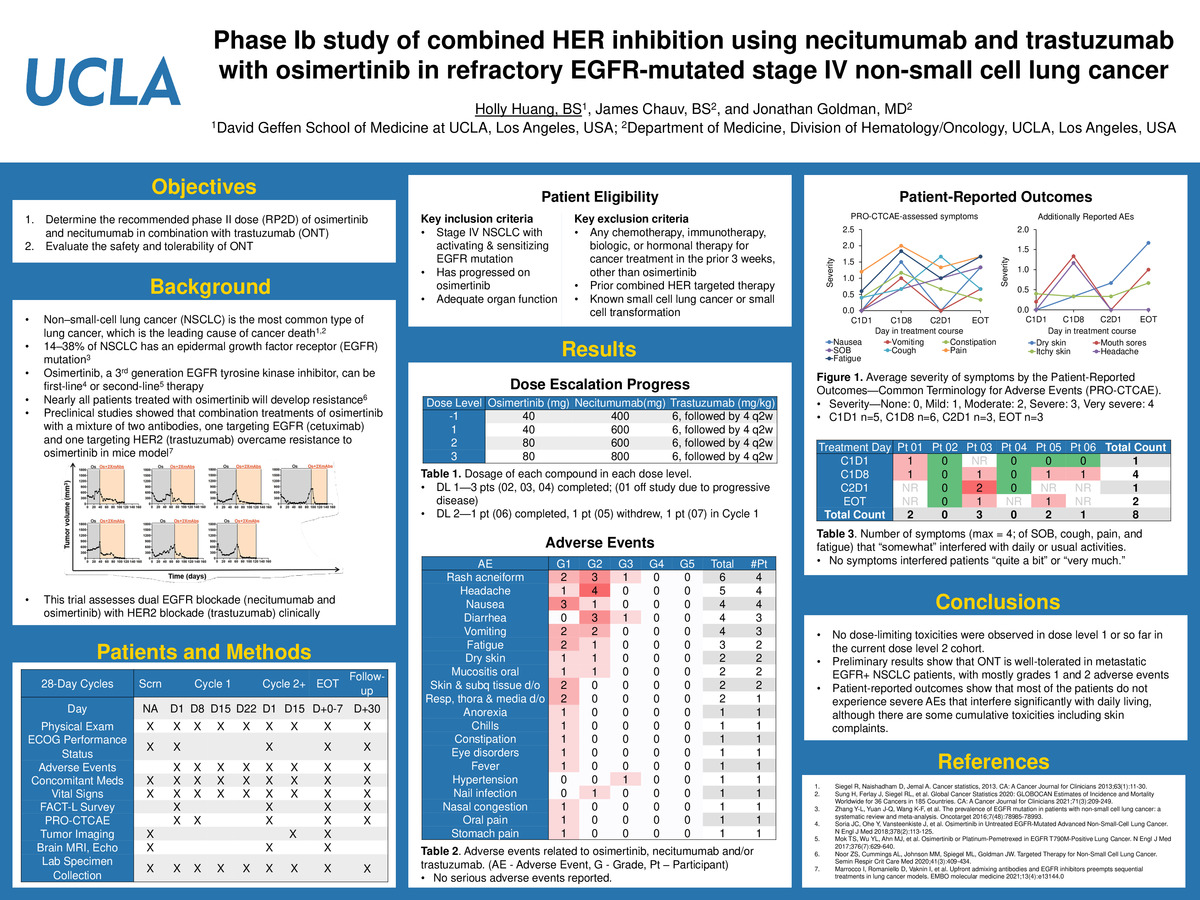-
Author
Holly Huang -
PI
Jonathan Goldman
-
Co-Author
Holly Huang, James Chauv
-
Title
Phase Ib study of combined HER inhibition using necitumumab and trastuzumab with osimertinib in refractory EGFR-mutated stage IV non-small cell lung cancer
-
Program
STTP
-
Other Program (if not listed above)
-
Abstract
Background
Patients with metastatic non-small cell lung cancer (NSCLC) who have progressed on osimertinib currently have no more approved targeted therapy. Many mechanisms and strategies have been proposed to overcome osimertinib resistance and eliminate cancer recurrence. One such strategy is to use dual EGFR blockade with HER2 blockade. This phase Ib study aims to determine the safety of such combination—osimertinib, necitumumab which is a humanized monoclonal antibody against EGFR, and trastuzumab which is a humanized monoclonal antibody against HER2 receptor.
Methods
Adults with histologically confirmed NSCLC that is metastatic with an activating and sensitizing EGFR mutation (e.g., exon 20 insertion mutations are excluded) were eligible for this study. The traditional 3+3 dose-escalation design was used to determine the recommended phase 2 dose (RP2D). Safety data were collected regularly by monitoring and documenting adverse events, full/ directed physical exams, vital signs, baseline EKG, ECOG performance status, tumor imaging/ disease assessment, brain imaging, and laboratory tests (CBC, CMP, urinalysis, and others).
Results
Dose escalation shows that dose level 1 is safe, and the study is currently assessing dose level 2 which involves 80 mg osimertinib PO QD, 600 mg necitumumab IV Q2W, and 6 mg/kg, followed by 4 mg/kg Q2W trastuzumab. Of the reported adverse events, rash acneiform occurred the most frequently (6), followed by headache (5) and nausea (4), occurring in 4 of 6 patients. No serious adverse events (grade 4 or 5) were reported. Patient-reported outcome surveys show that most patients on average experienced an increase in severity of symptoms from the first day of treatment to cycle 1 day 8. Dry skin, itchy skin, and shortness of breath consistently increased in average severity throughout treatment period. No symptoms including shortness of breath, cough, pain, and fatigue interfered patients’ daily life “quite a bit” or “very much.”
Conclusion
No dose limiting toxicities were observed in dose level 1 or so far in the current dose level 2 cohort. Preliminary results show that ONT is well tolerated in metastatic EGFR-positive NSCLC patients, with mostly grades 1 and 2 adverse events. Patient reported outcomes show that most of the patients do not experience severe AEs that interfere significantly with daily living, although there are some cumulative toxicities including skin complaints.
-
PDF
-
Zoom

